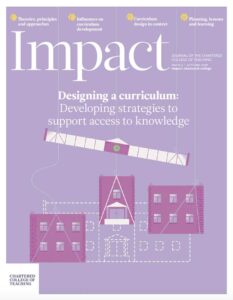Practical approaches to embedding research in schools: Key learning and reflections from the Research in Schools Learning Community

In 2017, the Department for EducationThe ministerial department responsible for children’s services and education in England published a report that examined the progress of evidenced-informed teaching in England. The findings suggest that despite limited direct application of research in teachers’ practice, evidence was valued and did inform teacher thinking (Coldwell et al., 2017). Alongside this report, there were other developments that showed that evidence-informed teaching was a paradigm that was here to stay. For example, schools began to appoint people responsible for facilitating and disseminating research within their institutions (for the purposes of this article, we refer to these individuals as Research Leads (RLs), although we acknowledge that a range of titles exists for primarily the same role). In addition, the Education Endowment Foundation (EEF) became prominent in many schools, specifically as a result of their ‘Teaching and Learning Toolkit’ research findings, and their funding opportunities that enable schools to become research schools, with the aim of using evidence to improve attainment.
Within this wider discussion of evidence-informed teaching, our group, the Research in Schools Learning Community (RiSLC), was launched in May 2017. Our primary objective is to create a professional forum for RLs, as a space within which to share practice, discuss ideas and troubleshoot challenges together, and therefore create opportunities to learn from, and with, one another. Membership is open to all schools, irrespective of sector, location and the stage they are at in terms of their use of research. Most recently, the authors of this article participated in a collaborative research project focused on identifying common factors significant to – and also those that inhibit – the effective development and growth of a research-informed culture in our schools. Our framework for analysis was guided by the self-review tool created by the National Foundation for Educational Research (NFER, 2015), which supported us in producing case studies of our schools. As individuals with key responsibilities for leading and supporting research activities in our institutions, those involved felt suitably placed to undertake this work. In this article, we discuss our findings across four sections: school-level factors, Research Lead-level factors, practical suggestions for embedding research in school culture, and effects on school culture and classroom pedagogy.
School-level factors
A key process that all schools identified as conducive to creating a research culture (for example, the provision and promotion of opportunities to conduct one’s own projects, and to discuss and debate external research findings) was the need to have senior leadership team (SLT) buy-in, whilst ensuring engagement and commitment from the bottom up: the teaching staff. To aid this process, some schools give dedicated INSET time to engage either with or in research: from whole-school article activities, whereby schools produce their own written output and/or discuss published work, to inviting academic keynote speakers or holding marketplace events to showcase staff research projects. Although we argue that research in schools should be supported by SLT, common consensus among the authors was that engaging in/with research should remain voluntary rather than a mandatory obligation.
More importantly, a key element to sustaining a research-engaged culture is the creation of a role that recognises the significance of research – for example, a Research Lead (RL) post. This individual needs to be given the authority to help drive enthusiasm forward and facilitate rigorous methodologies, whilst working in close partnership with SLT. Similarly, success has been seen when SLT have provided time for research engagement and/or a financial incentive has been available, such as bursaries, research allowances and/or support for those wanting to pursue an MA, MSc, MEd or PhD degree. However, perhaps one of the most important incentives is to provide meaningful support for research, for example, through opportunities to share one’s work. Encouraging the sharing of findings helps to develop enthusiasm and raise the profile of the work conducted and acts as a clear signal that findings can have an impact beyond one’s own classroom. Additional support mechanisms include providing access to academic resources through membership to the Institute of Education’s library (IoE), the British Educational Research Association (BERA) or the Chartered College of Teaching (CCT).
It is common to see schools strive to recognise that central to their continuous improvement agenda is the expectation for all staff to be reflective practitioners, i.e. to not just be aware of others’ research but to also question its potential relevance and implications in relation to teaching and learning in their own context. To help achieve this, school priorities could be set with a research focus stipulation. Oftentimes in our schools, the RLs work closely with SLT to consider research when identifying school improvement plans, strategic goals and teaching and learning priorities. Research results generated by staff can help to shape school decisions and have often resulted in modifications to internal policies. For example, a study into whether removing the Key Stage 3 relative grading system can improve students’ well-being and performance led to a comment-only marking assessment policy being introduced for Years 7 to 9 at one school. Another school saw priorities set around how much homework to give and how best to report on student progress as a result of an extensive literature review. Allowing research to have an impact at school policy level is where research has its greatest influence and bearing, but it is this area that is perhaps the hardest to implement and sustain.
Research Lead-level factors
The RLs in the various case studies mentioned different ways that they engage both with and in research. For example, they have developed their own action research enquiries relevant to their specific contexts and used these to address problems and develop effective practice. Internal collaboration was evident in all of the case studies, and several schools have established ‘Educational Reading’ or ‘Teaching and Learning’ groups in which teachers engage in pedagogical discussion and debate. These opportunities provide a forum in which ‘taken for-granted thinking is challenged and professional judgement is refined’ (Pollard, 2010); the RLs believe that this encourages practitioners to engage with research in a meaningful way.
In the case studies, there was a distinction between engaging with and engaging in research. Being aware of the evidence, having the confidence to engage critically with this, and taking a reflective approach to one’s practice can be deemed as being of equal importance to conducting one’s own research. Not all teachers have research experience and we would argue that this is not a fundamental issue; conversely, a predisposition to being positive towards the potential affordances of engaging with, and in, research is essential if schools are to make headway with the development and sustainability of a research culture.
With time and access to resources being two of the main barriers for teachers engaging with academic research (McGill, 2015) or being involved in action research themselves, there is a clear rationale for the role of an RL in any school. Our case study data showed that RLs perform a number of key functions that help to make research accessible to staff: they can lead or organise research training opportunities; they can help to curate relevant materials and they can mentor those new to research. All of this points to the idea that engagement with, and in, research can take many forms and need not onerously add to teachers’ workload.
Practical suggestions for embedding research in school culture
ACCESS
- Use a range of forums, such as newsletters, posters, emails, online platforms to share suggestions for accessible research papers, summaries, blogs and articles
- Make staff aware of relevant organisations and the resources and support they offer, such as the Chartered College of Teaching, the British Educational Research Association (BERA), the Research in Schools Learning Community (RiSLC) and ResearchED
- Develop a physical and/or online research library
- Involve students in research activities as both participants and researchers, e.g. establish a Student Research Committee
SUPPORT
- Encourage SLT to provide, and model, the structures for research-engaged practice
- Offer training to staff to enable them to develop skills to engage in, and with, research
- Create space within CPD (continuing professional development) programmes for staff to conduct action research projects
- Appoint a school Research Lead to guide and support staff
- Draw on external expertise, e.g. from a local university or research school, academics or published speakers, or organisations such as the EEF and CUREE.
SHARE
- Create discussion and sharing opportunities, e.g. a journal or book club, ‘TeachMeets’, a marketplace or exchange event, or using an online platform
- Encourage staff pursuing postgraduate studies to share their learning with others
- Develop systems for research findings to be shared with the wider school community, and highlight where both external and internal research have influenced decision-making.
Effects on school culture and classroom pedagogy
Engagement with, and in, research empowers teachers to make evidence-informed choices about their practice and has been identified as a key feature of effective professional development (Cordingley et al., 2015). This is crucial when research has suggested that a significant percentage of classroom-level variance in pupil performance can be accounted for by teacher effectiveness (Muijs and Reynolds, 2011). As well as influencing individual practice, research engagement can help to foster a more collaborative and critical professional culture, and the inclusionAn approach where a school aims to ensure that all children are educated together, with support for those who require it to access the full curriculum and contribute to and participate in all aspects of school life of students as researchers can transform the quality of pupil voice (Fielding and Bragg, 2003). For example, in one school, sixth form students have conducted research that has contributed to a review of the institution’s policy on gender equality.
The aforementioned strategies have been used to raise the profile of research and evidence use across all member schools of the Research in Schools Learning Community. Teachers have been supported to develop the skills and confidence to access, interpret and engage with academic research, they are encouraged to undertake their own projects and evaluate evidence of their interventions, and the results of their work have been seen being used to inform school-level decision-making. Embedding a culture of research takes time, but in each of our case study schools there is already much evidence to indicate that this has been both positive and beneficial.
Conclusion
This cross-sector collaborative research has enabled the RiSLC to distil the factors that have been instrumental in developing a research-informed and research-engaged culture in our respective schools: namely, a clear set of strategic goals, matched with enthusiasm, practical support and opportunities, and an open mindset at SLT- and practitioner-level towards the potential affordances of engaging in, and with, research. Whilst the effect on student learning should be at the heart of any research project, this study has found that the complexities of measuring this rigorously can potentially hinder the sustainability of research activities in schools, and we acknowledge this as an area that requires further work.










